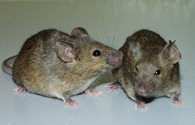According to a new study by researchers from the Peking University in Beijing, National Institute of Biological Sciences, and Washington University in St. Louis, the brain chemical serotonin may play a role in sexual preference such that male mice lacking serotonin began wooing other males with "mating calls" and made attempts to mate with them.

Quoting the study published in the international scientific journal Nature on March 23, the BBC last week reported that researchers say it is the first time that a neurotransmitter has been shown to play a role in sexual preference in mammals.
A series of experiments demonstrated that the mice, whose brains were not receptive to serotonin, had lost the preference for females shown by unmodified males. They showed no overall preference for either males or females when presented with a choice of partners.
When just a male was introduced into the cage, the "modified" males were far more likely to mount the male and emit a "mating call" normally given off when encountering females than unmodified males were.
Similar results were achieved when a different set of mice were bred. These lacked the tryptonphan hydroxylase 2 gene, which is needed to produce serotonin.
However, researchers managed to "restore" the mice's preference for females by injecting serotonin into the brain.
The report concludes: "Serotonergic signalling is crucial for male sexual preference in mice. This is the first time, to our knowledge, that a neurotransmitter in the brain has been demonstrated to be important in mammalian sexual preference."
Experts however have warned against drawing conclusions about human sexuality based on this research.
Professor Keith Kendrick, a neuroscientist at the Babraham Institute in Cambridge, said: "In terms of having potential relevance to understanding human sexual preference/orientation, we are of course far less influenced by odour cues in this context than mice are.
"There is some very limited evidence for altered responses to selective serotonin uptake inhibitors (SSRIs) in the brains of homosexuals, but we have been using psychoactive drugs which either increase or decrease serotonin function for quite some time now, and while effects on sexual arousal, impulsivity and aggression have often been reported, no effects on sexual preference/orientation have.
"At this time therefore any potential links between serotonin and human sexual preferences must be considered somewhat tenuous."
